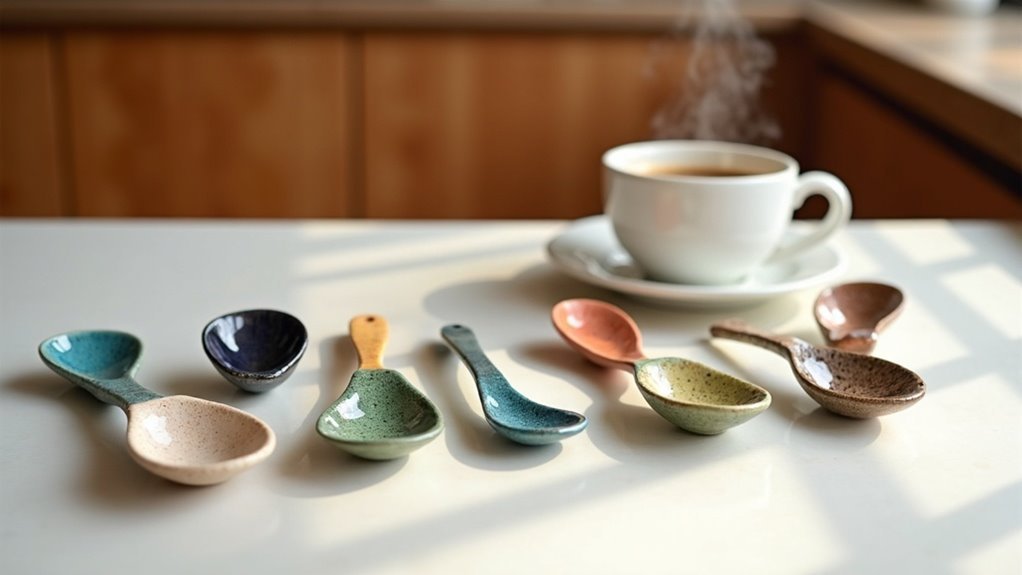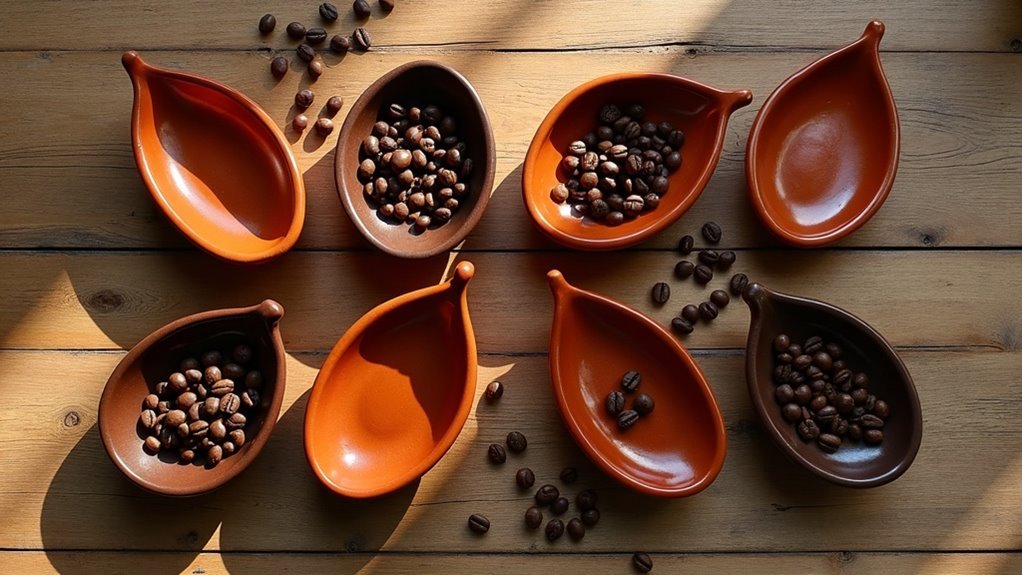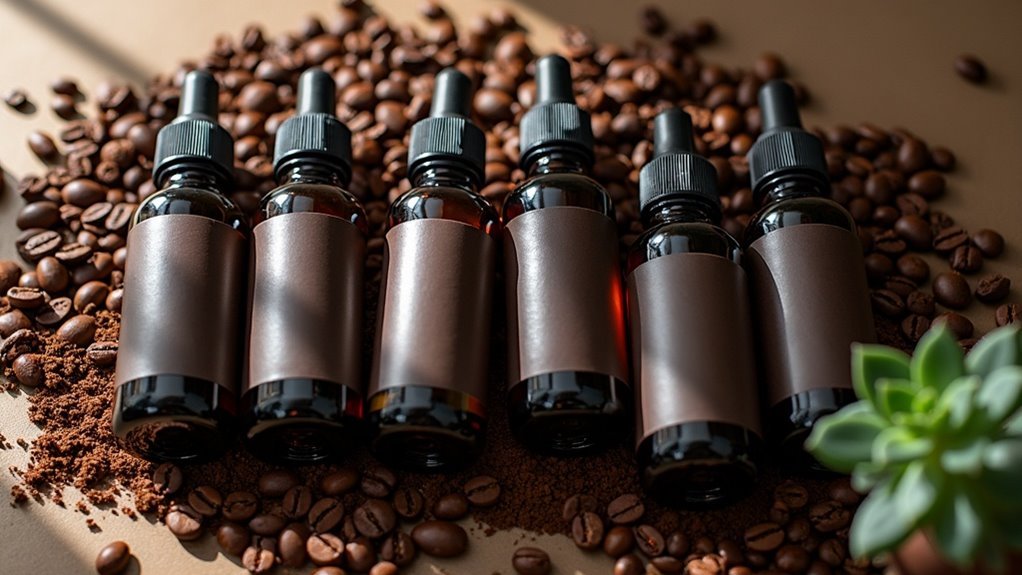Maragogipe coffee is a rare Arabica variety, often referred to as “Elephant Beans” due to its impressive size. This unique coffee was discovered in Brazil and is primarily cultivated in Latin America. It is celebrated for its distinct flavor profile, which includes delightful notes of honey, peach, and a rich earthiness. The low yield of Maragogipe coffee presents agricultural challenges, contributing to its higher market prices. Despite its rarity, it remains highly sought after by coffee enthusiasts around the world. If you’re interested in learning more about its cultivation practices and market trends, there is a wealth of information available to explore.
Key Takeaways
- Maragogipe coffee, often referred to as “Elephant Beans,” is a rare Arabica variety that was first discovered in Brazil in 1870.
- It is distinguished by its tall plants, lower yield, and unique flavor profile that includes notes of honey, peach, and bergamot.
- The flavor and aroma of Maragogipe coffee are greatly influenced by the high-altitude growing conditions and specific soil characteristics in which it is cultivated.
- Cultivating this coffee is challenging due to its susceptibility to diseases and the necessity for complex agronomic practices.
- As a result of its rarity and the high demand from specialty coffee enthusiasts, Maragogipe coffee is typically priced higher than standard Arabica varieties.
Overview of Maragogipe Coffee
When exploring the world of coffee, you might come across Maragogipe coffee, a rare Arabica variety that stands out for its exceptionally large beans, often dubbed “Elephant Beans.”
First discovered in Brazil in 1870, this unique cultivar is primarily grown in Latin America and is notable for its tall plants and low yield, making it less common than other coffee types.
First discovered in Brazil in 1870, Maragogipe is a rare cultivar known for its tall stature and low yield.
The porous nature of Maragogipe coffee beans contributes to their flavor variability, with soil characteristics playing a significant role in their taste profile.
While some enthusiasts consider them among the finest coffees available, agricultural challenges hinder widespread cultivation, increasing their rarity and market value.
Flavor Characteristics
When you explore Maragogipe coffee, you’ll notice its unique flavor profile, shaped by various factors including the soil it’s grown in.
The aromatic complexity of this coffee offers tasting notes of honey, peach, and bergamot, making each cup a distinct experience.
Understanding these characteristics can enhance your appreciation for one of the finest coffees available.
Unique Flavor Profile
Maragogipe coffee captivates with its unique flavor profile, heavily influenced by the soil where it’s cultivated. This remarkable coffee, known for its large beans, offers a diverse range of tasting notes that reflect its rich environment:
- Honey and peach sweetness
- Crisp white grapes
- Bright bergamot undertones
- Subtle hops characteristics
- Tropical fruit and earthy richness
Grown at high altitudes, Maragogipe coffee’s mellow flavor and fine acidity make it stand out among the best.
The porous nature of the beans enhances flavor delivery, allowing Maragogipe to be celebrated as one of the finest coffees available, thanks to its distinctive and complex taste.
Aroma and Complexity
The aroma of Maragogipe coffee is a defining characteristic that enhances its appeal, featuring an intricate blend of floral, fruity, and nutty notes. This complexity invites coffee enthusiasts to explore the diverse flavor profiles resulting from its unique bean structure. With tasting notes of honey, peach, and white grapes, each cup offers a delightful experience.
| Aroma Component | Description | Emotional Impact |
|---|---|---|
| Floral | Delicate and inviting | Uplifting and invigorating |
| Fruity | Bright and juicy | Cheerful and vibrant |
| Nutty | Rich and comforting | Warm and nostalgic |
Critics often regard Maragogipe coffee as one of the finest options available for coffee lovers.
Influence of Soil
Flavor characteristics in Maragogipe coffee are deeply influenced by the soil in which it’s cultivated. The rich and fertile soils contribute to complex flavor profiles, while less fertile soils yield weaker tastes.
The porous nature of large Maragogipe beans allows them to absorb essential minerals and nutrients, enhancing flavor variability. Key factors include:
- Soil acidity impacting flavor balance
- Nutrient composition defining taste nuances
- Fertility level determining overall quality
- Unique minerals enhancing floral and fruity notes
- Specific conditions creating distinctive tasting experiences
These aspects reveal why enthusiasts regard Maragogipe as one of the finest coffees available.
The unique interplay between soil and flavor makes Maragogipe a standout choice for coffee lovers exploring rich and varied coffee experiences.
Agricultural Challenges
Cultivating Maragogipe coffee is renowned for its unique flavor profiles, but it also presents significant agricultural challenges that can deter farmers. These plants are known for being low-yielding, which makes them less attractive for replanting. Their flavor quality is heavily influenced by soil characteristics, with richer soils producing superior flavors. However, Maragogipe coffee plants are highly susceptible to diseases such as coffee leaf rust and Coffee Berry Disease. The agronomic practices required for their cultivation are complex and demand careful management. Furthermore, farmers must navigate sustainability concerns stemming from low productivity, especially amidst the pressures of climate change and evolving plant diseases.
| Challenge | Impact on Farmers | Solution Approach |
|---|---|---|
| Low Yielding | Reduced profitability | Crop diversification |
| Soil Dependency | Inconsistent quality | Soil management practices |
| Disease Susceptibility | Increased losses | Integrated pest management |
| Sustainability Concerns | Long-term viability | Sustainable farming methods |
Brewing Methods
When brewing Maragogype coffee, selecting the ideal method is crucial for unlocking its unique flavor profile.
Classic drip brewing provides a reliable and consistent cup, while pour-over techniques can enhance its aromatic qualities.
Feel free to explore other options like French press or Aeropress to discover which method best aligns with your personal taste preferences.
Recommended Brewing Techniques
To fully appreciate the distinctive characteristics of Maragogipe coffee, choosing the right brewing technique is essential. Your coffee ritual can greatly enhance the experience.
Consider these methods:
- Classic drip brew for ease and consistency.
- Pour-over technique to highlight floral and fruity notes.
- French press to enhance richness and body.
- Experiment with various styles to find your preference.
- Pay attention to water temperature and grind size for ideal flavor.
Flavor Extraction Tips
Choosing the right brewing method can greatly enhance the flavor extraction of Maragogipe coffee, allowing you to fully appreciate its unique characteristics.
For ideal flavor extraction tips, consider classic drip brewing for consistency, or a pour-over technique to highlight the floral and fruity notes of these Elephant Beans. A French press can enrich the coffee’s body, emphasizing its smoothness.
Experimenting with different brewing styles is crucial since the porous nature of Maragogipe beans leads to varied flavors. Always aim for a brewing temperature between 195°F and 205°F to ensure you extract the best flavors, resulting in a balanced and enjoyable cup of coffee.
Equipment Choices Explained
While various brewing methods exist, selecting the right equipment is crucial for maximizing the unique flavors of Maragogipe coffee.
Each method can produce a coffee that highlights different characteristics, so consider these options:
- Classic drip brewing for ease and consistency
- Pour-over to accentuate floral and fruity notes
- French press for a rich, full-bodied experience
- Aeropress for versatility and experimentation
- Cold brew for a smooth, invigorating taste
Adjusting grind size and brewing time for your chosen method guarantees you optimize the flavor profile, allowing you to truly appreciate the distinct qualities of Maragogipe coffee.
Customer Reviews
How do customers feel about Maragogype coffee? Reviews highlight its unique flavor profile, with many appreciating its smoothness and rich taste.
For instance, user Ellis L. Cotlar rated it as “EXCELLENT,” noting its body and flavor but only gave four stars due to personal preferences for other varieties.
Overall, satisfaction levels are high, with a consistent emphasis on the quality and distinctiveness of the large size beans.
Satisfaction levels are notably high, highlighting the exceptional quality and unique characteristics of Maragogype’s large beans.
Customers often mention the rarity of Maragogype coffee, which adds to its desirability. Many express their intention to repurchase, indicating its strong appeal among coffee enthusiasts seeking specialty options.
Pricing and Availability
Maragogype coffee typically falls within the price range of $32.00 to $62.00 per bag, reflecting its rarity and distinct characteristics.
Availability can vary depending on stock levels, making it a sought-after choice for specialty coffee enthusiasts.
- In the UK, 250g of Guatemalan Maragogype beans is priced at £8.00.
- Prices are often higher than standard Arabica varieties due to the larger bean size.
- The lower yield of Maragogype beans also contributes to their cost.
- Subscription services, such as Hala Tree Coffee Club, enhance accessibility for those looking to enjoy this unique coffee.
- Expect varying availability based on demand and supply fluctuations, as Maragogype coffee is highly sought after.
World Coffee Research Insights
As the demand for specialty coffee continues to grow, insights from World Coffee Research play an essential role in enhancing the understanding and cultivation of unique varietals like Maragogipe.
They focus on improving cultivation practices and the quality of coffee supplies, providing resources such as a coffee variety catalog.
Maragogipe, which belongs to the Bourbon-Typica group, requires careful attention to the specific soil in which it grows. Its low yield and susceptibility to disease necessitate informed management.








